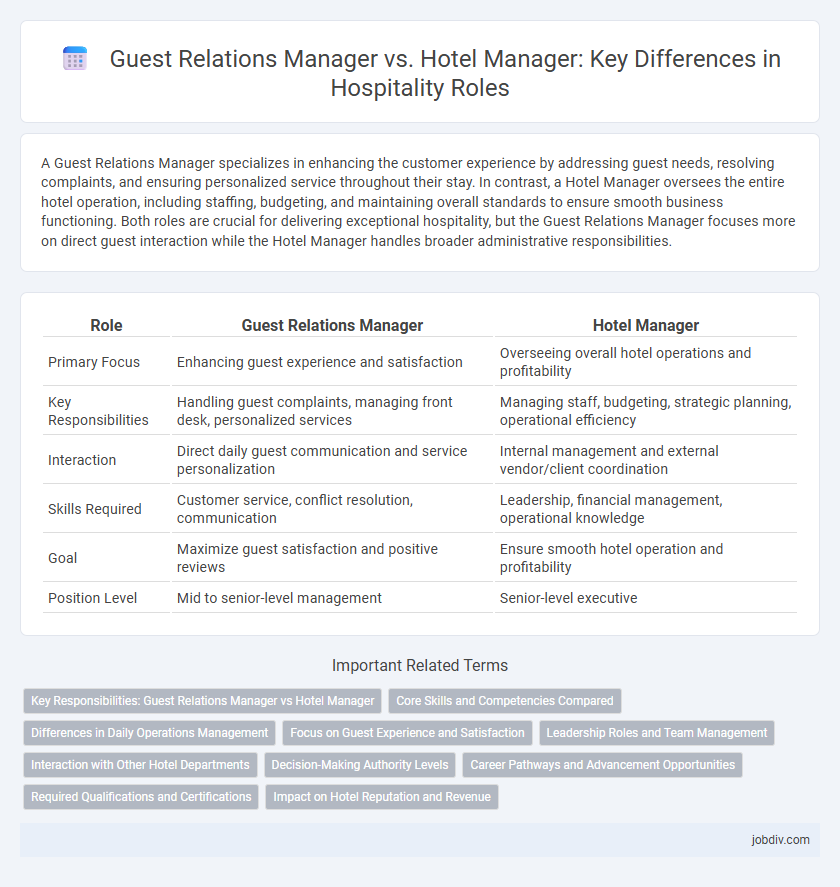A Guest Relations Manager specializes in enhancing the customer experience by addressing guest needs, resolving complaints, and ensuring personalized service throughout their stay. In contrast, a Hotel Manager oversees the entire hotel operation, including staffing, budgeting, and maintaining overall standards to ensure smooth business functioning. Both roles are crucial for delivering exceptional hospitality, but the Guest Relations Manager focuses more on direct guest interaction while the Hotel Manager handles broader administrative responsibilities.
Table of Comparison
| Role | Guest Relations Manager | Hotel Manager |
|---|---|---|
| Primary Focus | Enhancing guest experience and satisfaction | Overseeing overall hotel operations and profitability |
| Key Responsibilities | Handling guest complaints, managing front desk, personalized services | Managing staff, budgeting, strategic planning, operational efficiency |
| Interaction | Direct daily guest communication and service personalization | Internal management and external vendor/client coordination |
| Skills Required | Customer service, conflict resolution, communication | Leadership, financial management, operational knowledge |
| Goal | Maximize guest satisfaction and positive reviews | Ensure smooth hotel operation and profitability |
| Position Level | Mid to senior-level management | Senior-level executive |
Key Responsibilities: Guest Relations Manager vs Hotel Manager
Guest Relations Managers focus on enhancing guest experience through personalized services, handling complaints, and ensuring guest satisfaction by coordinating with various hotel departments. Hotel Managers oversee the overall operational aspects of the property, including staff management, budgeting, marketing, and maintaining quality standards. While Guest Relations Managers specialize in guest interactions, Hotel Managers hold broader responsibilities for business performance and facility management.
Core Skills and Competencies Compared
Guest Relations Managers excel in interpersonal communication, conflict resolution, and customer service excellence, ensuring personalized guest experiences and satisfaction. Hotel Managers demonstrate strong leadership, financial acumen, and operational oversight skills, managing staff, budgets, and overall property performance. Both roles require problem-solving abilities, but Guest Relations Managers prioritize guest interactions while Hotel Managers focus on strategic management and facility operations.
Differences in Daily Operations Management
Guest Relations Managers primarily focus on enhancing guest experiences by addressing individual needs, managing complaints, and ensuring personalized service throughout the guest's stay. Hotel Managers oversee broader operational aspects including staff coordination, budgeting, maintenance, and overall property management to ensure smooth functioning across all departments. Daily operations management for Guest Relations Managers centers on direct guest interaction and satisfaction, whereas Hotel Managers concentrate on strategic planning and multi-departmental oversight.
Focus on Guest Experience and Satisfaction
Guest Relations Managers prioritize enhancing guest experience by addressing individual needs, resolving complaints, and ensuring personalized services that foster loyalty and positive reviews. Hotel Managers oversee overall hotel operations, balancing guest satisfaction with budget management, staff coordination, and strategic planning to maintain service quality. Both roles are critical in driving customer satisfaction, but Guest Relations Managers specialize in direct guest interactions while Hotel Managers ensure the entire hotel's performance supports a seamless guest experience.
Leadership Roles and Team Management
Guest Relations Managers specialize in enhancing guest satisfaction by leading front-of-house teams to deliver personalized service and swiftly resolve issues. Hotel Managers oversee overall hotel operations, managing diverse departments such as housekeeping, food and beverage, and maintenance while aligning team performance with business objectives. Strong leadership and effective team management skills are essential for both roles to drive operational excellence and maintain high guest satisfaction ratings.
Interaction with Other Hotel Departments
Guest Relations Managers coordinate closely with front desk, housekeeping, and food and beverage teams to ensure seamless guest experiences by addressing personalized needs and resolving issues promptly. Hotel Managers oversee broader interdepartmental collaboration, including maintenance, accounting, and sales, to optimize overall hotel operations and profitability. Effective communication between these roles enhances service quality and operational efficiency across all hotel departments.
Decision-Making Authority Levels
Guest Relations Managers focus on enhancing guest experience by handling complaints and personalizing services, operating with decision-making authority primarily over front-of-house interactions and guest satisfaction protocols. Hotel Managers hold broader decision-making power encompassing overall hotel operations, including financial management, staffing, marketing strategies, and compliance with regulations. The hierarchical structure places Hotel Managers at the top, with Guest Relations Managers reporting to them, ensuring alignment of guest services with organizational objectives.
Career Pathways and Advancement Opportunities
Guest Relations Managers typically focus on enhancing guest experiences through personalized services, often progressing to roles such as Director of Guest Services or Customer Experience Manager. Hotel Managers oversee overall hotel operations, with career advancement leading to positions like Regional Manager or General Manager within larger hotel chains. Both pathways offer strategic leadership opportunities, yet Hotel Managers usually have broader operational responsibilities influencing higher-level executive roles.
Required Qualifications and Certifications
Guest Relations Managers typically require strong interpersonal skills with certifications such as a diploma in hospitality management or customer service excellence programs to enhance guest satisfaction. Hotel Managers often need more extensive qualifications, including a bachelor's degree in hospitality management or business administration, alongside certifications like Certified Hotel Administrator (CHA) to oversee hotel operations effectively. Both roles benefit from experience in the hospitality industry, but Hotel Managers demand broader leadership skills and comprehensive knowledge of financial management and regulatory compliance.
Impact on Hotel Reputation and Revenue
Guest Relations Managers directly influence hotel reputation by ensuring personalized guest experiences, promptly resolving complaints, and fostering positive reviews that drive repeat business. Hotel Managers oversee overall operations, balancing financial performance, staff management, and strategic marketing to maximize revenue and maintain brand standards. Both roles are crucial; however, Guest Relations Managers enhance guest satisfaction to boost reputation, while Hotel Managers focus on broader operational efficiency to increase profitability.
Guest Relations Manager vs Hotel Manager Infographic

 jobdiv.com
jobdiv.com